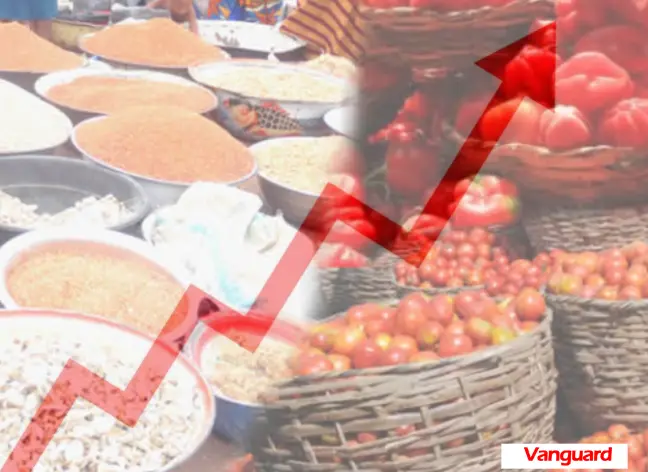exchange rate: The reason why despite the Naira’s gain, goods costs would stay high

The rapid rise of the Naira against major foreign currencies in recent weeks does not seem to be a guarantee that prices for goods and services would drop anytime soon.
US dollars were trading for N1,060 on Thursday, up around N840 from the N1,900 top reached by US dollars in February of this year. However, Vanguard’s data indicates that market prices are still rising, defying popular belief that market pricing and the overall cost of living should be declining given the exchange rate’s sustained upward trend, which began in late February.
The majority of vendors and manufacturers of products and services attributed the market’s spiraling price hikes to the high exchange rate.
However, the National Bureau of Statistics (NBS) reported a further increase in inflation with a headline rate of 33.2% in March compared to 31.7% in February, while food inflation increased to 40.02% from 37%. This was against the backdrop of positive stability in the foreign exchange market.
Before marginal stability can occur, financial analysts and economists who spoke with Vanguard predicted further increases in the costs of goods and services in the months to come.
Additionally, they made hints that before the impact of the lower exchange rate can positively affect the prices of goods and services, other aspects of the cost of doing business would need to decrease and the current positive development in the foreign exchange market would need to be sustained over a longer period of time.
Furthermore, they clarified that whereas price rises react more quickly to increases in important production variables, the opposite is true when the elements are declining.
Positive improvements in exchange rates take time to reflect in consumer goods pricing, according to the analysts. Victor Chiazor, Head of Research at FSL Securities, an investment firm with offices in Lagos, provided an explanation for the disparity between the stability of the exchange rate and the volatility of consumer prices. He stated that, “apart from the time lag for the stability in the exchange rate to begin reflecting in the prices of goods and services, Nigerian price history shows that prices are sticky downward but reflect immediately upwards.”
He did, however, provide more information: “High energy and transportation costs, along with the currency devaluation, were the initial causes of the rise in consumer goods prices.” However, even with the Naira’s recent strengthening versus the US dollar, energy and transportation expenses are still very high.
“This price distortion demonstrates the extent of the economy’s reliance on foreign exchange as well as the low level of government incentives and infrastructure support for locally produced goods.”It is nevertheless true that the policy will take some time to become effective, much as we have seen inflation grow in spite of several rises in the monetary policy rate intended to stop it.
“Since commodities and services are heavily reliant on currency rates, a similar situation is anticipated. The Naira’s appreciation will not immediately translate into a decrease in the price of goods and services.
He predicted that going ahead, the current course of action taken by the CBN Monetary Policy Committee, or MPC, team, will provide the intended outcome.
On the other hand, he stated that an extended period of monetary tightening would act as a barrier against economic expansion.
Therefore, in order to avoid sending the economy into a period of negative growth, it is imperative to properly monitor the economy and recognize when to ease off on its tightening posture.
According to economic and investment strategist Ayorinde Akinloye, “there is typically a time lag needed to see the impact of the policies on macroeconomic outcomes” once they are put into effect.Regarding the issue of the Naira’s appreciation and the continued high cost of goods and services, the bulk of consumer products in use were either produced or imported when the value of a dollar was at least N1,500. As a result, the effects of the appreciation during the previous month are yet unknown.
The pricey goods will usually need to be cleared out of the market 60 to 90 days before the cheaper goods that were imported can enter the market.
As a result, he stated that the effects of the Naira’s appreciation will be felt in late May or early June.
In a similar vein, Gafar Bashiru, Senior Associate at Parthian Partners, another investment firm with headquarters in Lagos, stated that while a stronger Naira should eventually lead to lower import costs and lower prices for consumer goods, other factors—such as time value, speculative pricing, and structural problems—have fueled the current gap.
“It often takes time for exchange rate changes to trickle down to consumer prices,” he said. Companies might hold off on raising prices until they are certain that the currency appreciation will continue. It might also be necessary to sell inventory acquired at higher exchange rates prior to price reductions.
Additionally, even with a stronger currency, factors like high transportation costs, insecurity, or inefficiencies in distribution networks might keep prices high. Businesses may be reluctant to cut prices right away out of concern for future depreciation, which could result in “sticky prices.”
Although prices haven’t dropped yet, the rate of increase is starting to slow down. The average price level is increasing at a slower rate than it was in February 2024, according to the month-over-month inflation statistic for March. It is anticipated that this tendency will continue in the upcoming months.
“Taking into account the base impact in the year-over-year statistics is also crucial. The decline in prices may seem less noteworthy given that consumer prices were already high prior to the Naira’s rise in the last two months (food and headline inflation were 33.20% and 40.00% in March, respectively, compared to 29.90% and 35.41% in January).
He added that the fiscal authority has a major role in implementing measures that can contribute to long-term price stability, even with the recent strengthening of the Naira.
He mentioned that among the necessary fiscal remedies were structural improvements and an emphasis on home manufacturing of competitively advantageous goods.
He states that “improving transportation infrastructure and lowering bureaucratic barriers are examples of addressing structural bottlenecks in the economy that can make businesses more efficient and potentially reduce production costs.” As a result, consumer prices will drop.
“Prices will be less susceptible to volatility and reliance on imports will decrease with the implementation of policies that encourage local production of necessities.”
Discover more from GISTVIBEZ
Subscribe to get the latest posts to your email.






